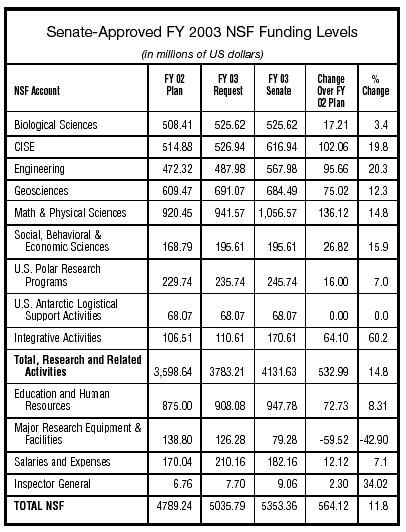THIS IS AN ARCHIVED VERSION OF CRA'S WEBSITE. THIS ARCHIVE IS AVAILABLE TO PROVIDE HISTORICAL CONTENT.
PLEASE VISIT HTTP://WWW.CRA.ORG FOR THE LATEST INFORMATION
| About CRA |
| Membership |
| CRA for Students |
| CRA for Faculty |
| CRA-Women |
| Computing Community Consortium (CCC) |
| Awards |
| Projects |
| Events |
| Jobs |
| Government Affairs |
| Computing Research Policy Blog |
| Publications |
| Data & Resources |
| CRA Bulletin |
| What's New |
| Contact |
| Home |
Back to September 2002 CRN Table of Contents
[Published originally in the September 2002 edition of Computing Research News, Vol. 14/No. 4, pp. 1, 7.]
Appropriations Kick Off with Good News for Researchers
By Peter Harsha
The first appropriations bills to emerge from Congressional appropriations committees this session indicate increasing support for federally sponsored fundamental research. House and Senate consideration of the President's proposal to create a new, cabinet-level Department of Homeland Security had delayed action on most of the 13 annual appropriations bills necessary to fund the federal government. However, by the August recess Senate appropriators had reported a bill (S. 2797) that would significantly increase the research budget of the National Science Foundation (NSF), and both the House and Senate appropriations committees had approved increases to science and technology funding at the Department of Defense (DOD).
In late July, the Senate Appropriations Subcommittee on Veterans Affairs, Housing and Urban Development, and Independent Agencies (VA-HUD) approved an increase of $564 million in NSF's overall FY 2003 budget, an increase of 11.8 percent over FY 2002. Included is a $533 million increase in NSF's core research account, nearly 15 percent over FY 2002 and enough to put the agency on pace to double its research budget in five years.
Of particular interest to the computing research community is the panel's approval of an increase of nearly 20 percent in NSF's Computer and Information Science and Engineering directorate over the FY 2002 level. Under the Senate plan, CISE's budget would increase to $617 million for FY 2003, $90 million more than the amount requested in the President's FY 2003 budget. Of that $90 million increase, $80 million is slated for additional research funding. The remaining $10 million would fund the Terascale Computing Program, which is being transferred to CISE from NSF's Major Research Equipment and Facilities account at a reduced funding level from the $20 million requested by the President.
In the Committee Report accompanying the VA-HUD Appropriations legislation, the Committee also directed NSF to spend $25 million of the approved increase for cyber security research and an additional $15 million of the increase for advanced broadband research. The report also noted that while the Nation remains vulnerable to cyber-attacks on critical components of the national infrastructure, the private sector has had little incentive to invest in cyber security, and "the Federal Government has not filled the gap, but instead has chronically underinvested in cyber security." As a result, the report continued, "What little research has been done on cyber security has been incremental, leaving the basic approaches to cyber security unchanged for decades." The report indicates the Committee expects NSF to use this new funding to support individual researchers and interdisciplinary centers in computer and network security research.
The Committee Report also contained comments about the recent report by the NSF's Blue-Ribbon Advisory Committee on Cyber-infrastructure, noting that the report's call for significant expansion in "high-performance computing, optical networking, software applications for 'e-science,' and large-scale digital libraries" could "accelerate the pace of discovery in all science and engineering disciplines, and serve as a 'multiplier' for the Government's substantial investment in R&D." The Committee urged NSF to give the report careful consideration in preparing its FY 2004 budget proposal.
The VA-HUD Appropriations bill will likely be considered by the full Senate in September. Work on the House version of the bill in committee was not completed before the House adjourned for Congress' traditional August recess. Though the Republican-controlled House is not expected to be quite as generous in its version of the VA-HUD Appropriation, there is clearly support for significant increases in NSF's research budget. In June, House members passed overwhelmingly a bill (H.R. 4664) introduced by House Science Subcommittee on Research Chair Nick Smith (R-MI) that would authorize funding increases of 15 percent at NSF for three years, setting a target of doubling the agency's current budget in five years. The Senate will take up its version of that bill in September.
House and Senate Appropriators also made progress on FY 2003 Defense Appropriations (H.R. 5010), with both committees reporting out versions that approve significant increases to DOD science and technology budgets. The House bill includes $11.3 billion for Defense Research, Development, Test, and Evaluation (RDT&E) in FY 2003, including $1.41 billion for basic research, $54 million more than the President's request. DARPA's Computing Systems and Communications Technology account would grow to $425 million in FY 2003, $500,000 over the President's request. The House plan would also provide $60 million for DARPA's Embedded Software and Pervasive Computing program. The bill passed the House by a 413 to 18 margin.
The Senate version of the bill includes $10.7 billion in RDT&E funding in FY 2003, slightly less than the House version, but includes $1.49 billion in basic research funding. The Senate plan would increase DARPA's Computing Systems and Communications Technology account by $59 million over the FY 2002 level, but still fall $7 million short of the President's requested level. The full Senate will take up the bill in September.
For the latest information developments in the appropriations process, check the CRA Government Affairs web site at http://www.cra.org/govaffairs.

Copyright © 2007 Computing Research Association. All Rights Reserved. Questions? E-mail: webmaster@cra.org.
